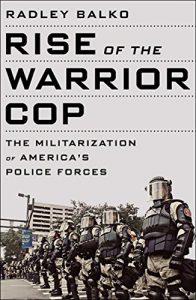 Due to the COVID crisis, the book originally planned for this week’s post got pushed back several months. And in light of recent events and how much I’ve been talking on Facebook about this particular book, I decided to dedicate this weekly post to it since it is so very crucial to understanding the events of the last week (and far longer). This week, we’re (now) looking at Rise of the Warrior Cop by Radley Balko.
Due to the COVID crisis, the book originally planned for this week’s post got pushed back several months. And in light of recent events and how much I’ve been talking on Facebook about this particular book, I decided to dedicate this weekly post to it since it is so very crucial to understanding the events of the last week (and far longer). This week, we’re (now) looking at Rise of the Warrior Cop by Radley Balko.
Quite simply, this is the singular most crucial book in understanding exactly how we got to the point we are currently in with policing in America, and the singular most comprehensive such book I’ve yet found. It is a very even look at the issue, published over a year before Michael Brown’s death and the subsequent explosion onto the national zeitgeist of the Black Lives Matter organization. Indeed, even my own Amazon review was published a week after the book’s publication, when Brown still had roughly 56 weeks left in his life. (An important distinction: In this era of my reading, writing a review *at all*, much less one the length of this series of posts, was extremely rare indeed. That alone should tell you how important I felt this book was, a feeling that has never really left even as I actively left behind the world of police accountability activism in favor of this very project.)
As I’ve been saying on Facebook, if the recommendations Balko discusses in Chapter 9 had been implemented immediately, there is a better than even chance that Brown, among literally thousands of others since his death, would at minimum have not been killed by police. Those recommendations fall into the following categories:
- End the Drug War.
- Halt Mission Creep.
- Transparency.
- Community Policing.
- Changing Police Culture.
- Accountability.
Most interestingly, Balko – again, writing this well more than a year before the creation of the “Black Lives Matter” organization that has since become so famous – wrote this to close the chapter:
The most difficult change is the one that’s probably necessary to make any of these others happen. The public needs to start caring about these issues. The proliferation of “cop watch” sites, citizen-shot video of police misconduct, and coverage of police abuse incidents by a bevy of online media is encouraging. Another good sign is the fact that this growing skepticism of police has been accompanied by a decline in violence against police officers themeselves. Activists are fighting police abuse with technology and information, not with threats and violence. But while exposing individual incidents of misconduct is important, particularly to the victim of misconduct, it’s more important to expose the policies that allow misconduct to flourish. Bad systems will continue to turn out bad results. And bad systems will never be reformed until and unless policymakers and politicians (a) are convinced there is a problem and (b) pay a political price for not addressing it. Yes, trends that develop over years or decades can gradually normalize things that we might not have tolerated had they been imposed on us all at once. But it’s still rather remarkable that domestic police officers are driving tanks and armored personnel carriers on American streets, breaking into homes and killing dogs over pot. They’re subjecting homes and businesses to commando raids for white-collar and even regulatory offenses, and there’s been barely any opposition or concern from anyone in Congress, any governor, or any mayor of a sizable city. That, more than anything, is what needs to change.
While comprehensive, the book even now will likely be quite controversial since in its tracing of the history of how we got to where we are now, several “sacred cow” assumptions and narratives that current politics are based on are pretty effectively shredded into little more than very fine confetti. On most all sides. Indeed, current Democratic Presidential candidate – and then Vice President at the time of publication – Joe Biden is referenced 7 times in this book, per its Index. Then President Barack Obama is only referenced 6 times, and immediately former President George W Bush is referenced 7 times. (1990s era President Bill Clinton is referenced 13 times, per the Index.)
So please, if you’re truly interested in knowing the basis of the current problem of policing in America and some very real, very practical ideas to end it, please read this book.
As always with these posts, the Amazon/Goodreads review:
Continue reading “Featured Release Of The Week: Rise Of The Warrior Cop by Radley Balko”


